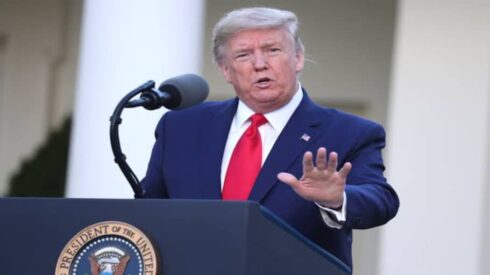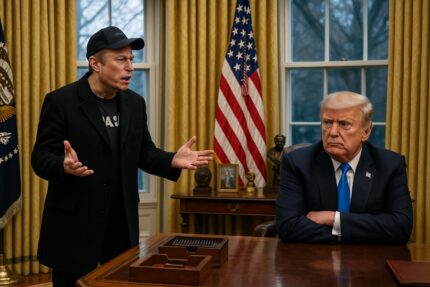President Donald Trump has defended his administration’s sweeping new tariffs on foreign imports, insisting they are necessary to restore American economic power—even if they cause short-term pain. Speaking to reporters aboard Air Force One late Sunday, Trump said the U.S. would emerge stronger, arguing the controversial decision would bring jobs and investment back into the country.
“I don’t want anything to go down,” Trump said, responding to questions about market turmoil. “But sometimes you have to take medicine to fix something.” The president brushed off concerns about rising consumer costs and a potential economic downturn, doubling down on his belief that the tariffs will correct longstanding trade imbalances and force foreign nations to negotiate fairer deals.
Trump also rejected criticism about the burden being placed on American consumers. When a reporter asked about the public’s tolerance for the financial impact, Trump snapped, “I think your question is so stupid,” before reiterating that the moves were necessary for long-term gain.
Global Stock Markets Recoil as Trump New Tariffs Bite
Trump’s announcement sent shockwaves through global financial markets, triggering steep declines and widespread panic among investors. In Asia, trading opened with deep losses on Monday. Japan’s Nikkei 225 index fell by 7.8%, while Hong Kong’s Hang Seng plunged over 12%, reflecting investor anxiety over the potential for a full-scale trade war.
The selloff extended to Wall Street, where Friday saw one of the worst days in recent years. All three major U.S. indices dropped more than 5%, with the S&P 500 suffering nearly a 6% loss—its worst week since the COVID-19 pandemic began in 2020. Even Middle Eastern markets were affected, with Saudi Arabia’s stock exchange tumbling nearly 7% on Sunday, marking its most significant daily decline in over four years.
Major financial institutions are already revising their forecasts. U.S. banking giant JP Morgan warned there is now a 60% chance of a recession in the U.S. and globally, citing heightened economic uncertainty triggered by the tariffs.
White House Officials Downplay Recession Risks
Top administration officials have rushed to contain the fallout, insisting that fears of a global recession are overblown. Treasury Secretary Scott Bessent said on NBC’s Meet the Press that the economic pain is only temporary and insisted there is “no reason” to expect a recession.
“This is an adjustment process,” Bessent explained, adding that over 50 countries had already approached Washington to discuss easing trade barriers, adjusting tariffs, and ending currency manipulation. “President Trump has created maximum leverage for himself.”
Commerce Secretary Howard Lutnick echoed that sentiment in an interview with CBS News. He confirmed that the new 10% baseline tariff on all imports, which took effect over the weekend, would “stay in place for days and weeks.” Lutnick also emphasized that more severe tariffs, especially targeting what he called the “worst offenders,” would go ahead as planned on Wednesday, April 9.
Global Reactions Mixed as Diplomatic Tensions Rise
The global response has varied, with some nations urging restraint while others prepare for retaliation. China announced it will impose a 34% tariff on all U.S. imports beginning Thursday, April 10, sparking fears of escalating economic conflict between the world’s two largest economies.
Meanwhile, some countries are choosing diplomacy over confrontation. Indonesia and Taiwan both stated over the weekend that they would not respond with retaliatory tariffs. Vietnam’s President To Lam formally requested a 45-day delay on the planned 46% duty on Vietnamese exports to the U.S., citing the need for negotiations.
In the UK, Prime Minister Sir Keir Starmer warned, “the world as we knew it has gone,” and expressed hope for a bilateral deal with the U.S. to shield British industries from the tariffs. A Downing Street spokesperson confirmed that Starmer had spoken with Canadian Prime Minister Mark Carney, with both leaders agreeing that “an all-out trade war is in no-one’s interest.”
Protests Erupt Across U.S. as Public Discontent Grows
Back home, the tariffs have triggered a new wave of protests against President Trump’s broader economic agenda. Over the weekend, massive demonstrations were held in cities including Boston, Chicago, Los Angeles, New York, and Washington DC, with hundreds of thousands marching in what has become the largest nationwide protest movement since Trump assumed office in January.
Protesters cited concerns ranging from job insecurity and rising consumer prices to broader dissatisfaction with the administration’s policies on healthcare, immigration, and environmental regulation. Many carried signs denouncing the tariffs and urging the White House to prioritize domestic economic stability over trade brinkmanship.
As Trump prepares to meet Israeli Prime Minister Benjamin Netanyahu in Washington this week—the first world leader to sit down with him since the tariffs took effect—analysts say the path forward remains uncertain. Whether the president’s “medicine” cures or worsens the patient remains to be seen.














